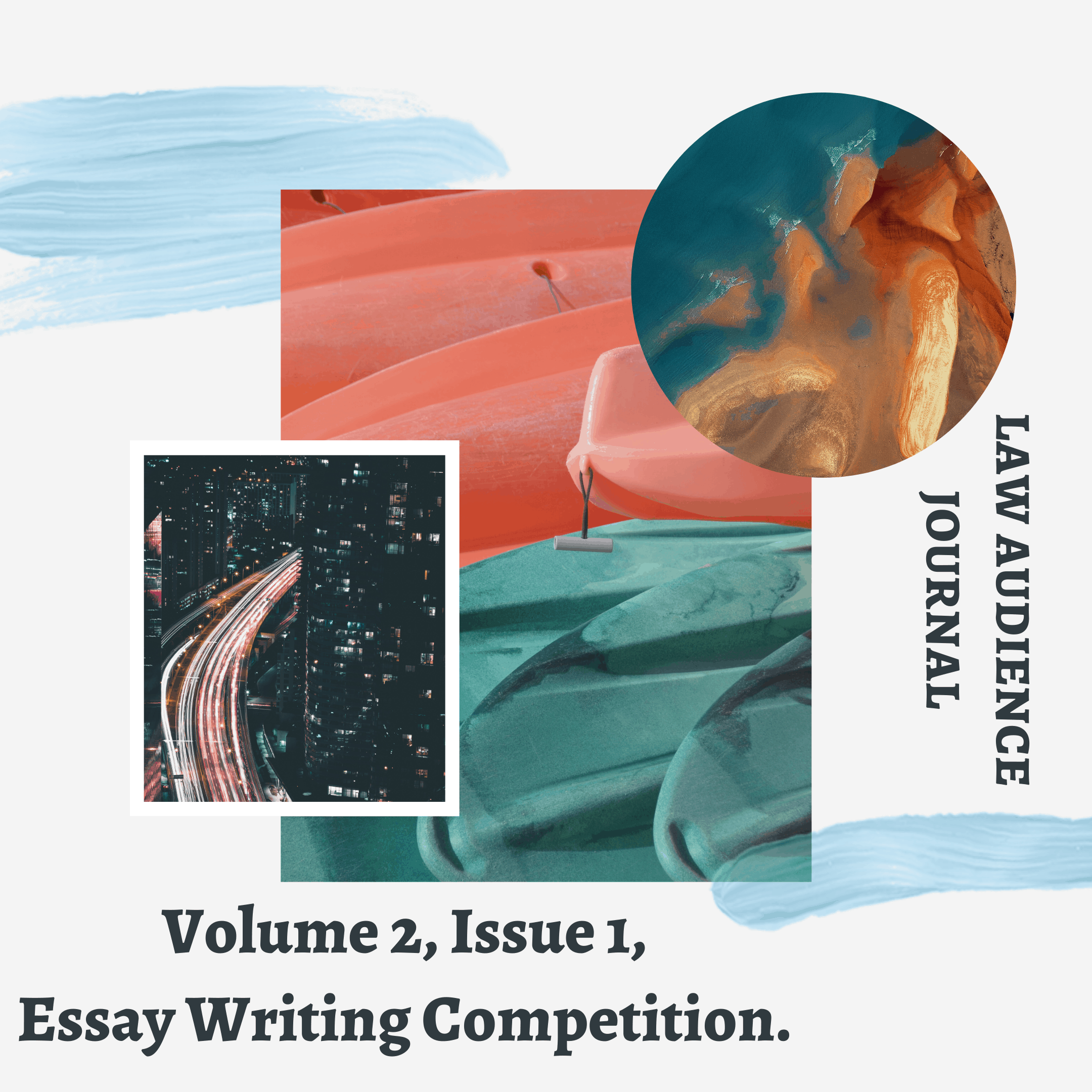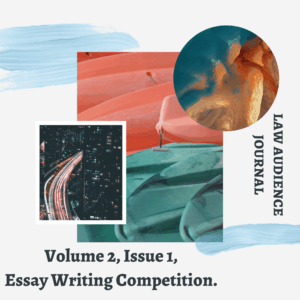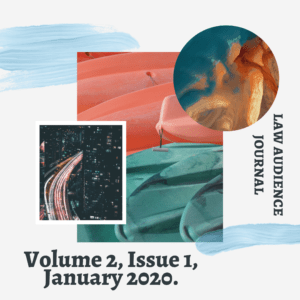AUTHORED BY: MS. Ananya Kishore (B.A.LL.B (Hons), NMIMS Kirit P. Mehta School of Law.
“Some great stories of big-hearted people coming up with new ways to come together—even while remaining apart—to help the vulnerable who face some very tough times ahead.”[1]
-Barack Obama.
I. INTRODUCTION:
With this tweet on March 19, 2020, Mr. Barack Obama shared that how the neighbourhood groups of Washington areas are forming militias of caring and help. The link shared by the former President of the United States helped us see that how the people are helping each other in their capacity; be it providing free foods to people by the restaurants or teenagers working as babysitters for the aid of children stuck at home, people are trying their level best to contribute in some way or the other in this very hour of need.[2] COVID-19 is one of the greatest challenges which the world is facing right now. The whole world is in a condition of lockdown either by their choice or by the orders of the government. This pandemic has shaken the world’s economy. Its consequences are not only limited to economic shutdowns but also political and social upheaval. According to the estimate of the World Labor Organization, a total of 25 million jobs could be lost due to this virus. People are in quarantine, the cities look deserted, the countries which were highly dependent on tourism have empty hotels, all the gathering events are cancelled and the whole world has come down to a standstill. This is what a small virus has done to us.[3] This pathogen which has shaken the very basis of human existence is declared a pandemic by the World Health Organization. The effect of this virus is not only limited to destruction of the economy in our country but it has also affected the legal sector of our country. Supreme Court under Article 142 [4] of the constitution has invoked its plenary powers to extend the ‘limitation period’ in all cases against its normal timeline under the Limitation Act of 1963. COVID-19 is all set up to disrupt the obligation formed by a contract. Suppliers or the manufactures, everyone is suffering due to this pandemic as they are unable to perform their part of the contract. The effect of this virus on the contractual obligation is humongous. [5]
II. CONTRACT:
The Indian Contract Act of 1872 in Section 2(h) defines a contract, the verbatim of which is, “An agreement enforceable by law is a Contract”[6]. With this definition, we can say that any agreement which is enforceable by the law of the land constitutes a contract. It is a legally binding agreement between two parties. Generally, a contract can be of two forms; a written contract and an oral contract[7]. There are several essentials to form a valid contract; some of them being the presence of at least two parties, the intent of legal obligation, the consent derived should be free, lawful consideration and the agreement must be possible to perform.[8] However, there are certain situations which can render a contract void. If a contract is void, it means that it is no longer in existence and can’t be enforced by law. The impossibility to perform a contract is one of the reasons which make the contract void and therefore, any contract which has become impossible to perform cannot be enforced by the court of law.[9]
III. DOCTRINE OF IMPOSSIBILITY AND DOCTRINE OF FRUSTRATION:
There are two types of impossibilities which are observed by law; subjective impossibility and objective impossibility. Subjective impossibility occurs when the promisor or any other person is unable to perform his/her part of the bargain due to illness or death. On the other hand, objective impossibility happens when the contractual duty cannot be performed due to destruction of the subject matter of the contract, due to supervening impossibility or the frustration of the purpose of the contract. However, there is a slight difference between the an impossibility and frustration of a contract. The main difference between the both is that in frustration of a contract the contract cannot be performed due to the extreme burden on the contracting party and if the contract becomes impossible to perform due to an intervening event which is unforeseen, it is termed as impossibility in law. However, in both situations, the contract becomes void.[10]
The first case which established the doctrine of impossibility was the case of Taylor v. Caldwell[11], In this case, a contract was signed where the plaintiff rented a music hall from the defendant. Unfortunately, before the contract could commence, the hall was destroyed by fire. The issued raised was whether the loss suffered by the plaintiff could be recovered by the defendant. The Court held that since the contract became impossible to perform due to the unforeseeable event, both the parties were excused from performing their part of the contract.[12]
On the other hand, in the case of, The Naihati Jute Mills Ltd v. Hyaliram Jagannath[13], the Court stated that “In cases of frustration it is the performance of the contract which comes to an end but the contract would still be in existence for purposes such as the resolution of disputes arising under or in ‘connection with it: and the question whether the contract was discharged under the doctrine of frustration would still have to be decided under the arbitration clause which operates in respect of such purposes.”
IV. FORCE MAJEURE AND DOCTRINE OF FRUSTRATION:
Contracts can also be avoided by the Force Majeure clause. Force Majeure or Vis major is the Latin of ‘Superior Force’. It basically means any occurring or event which is not in control of the humans or is unforeseeable. It includes happening such as fire, drought, terrorist attacks and many more. This doctrine is present in common law as the doctrine of frustration of contract. This doctrine releases the parties from any obligation to perform the contract. It is invoked in situations when the performance of the contract becomes impossible because of any unforeseeable and unstoppable happening or an event.[14]
In the case of Dhanrajamal Gobindram v. Shamji Kalidas and Co.[15], the Supreme Court while dealing with Force Majeure gave the widest definition of the former. The court said that “main intention of this clause is to save the performing party from the consequences which are outside the control of the party.” However, the Force Majeure clause cannot be invoked if the event is because of the fault of the party.[16]
A similarity between the Doctrine of Frustration and Force Majeure clause is that it discharges both the parties from performing their part of the contract. However, there is a small difference. Force Majeure clause can extend the time instead of relieving the parties from the contract. Generally, during the drafting of a contract, a clause of Force Majeure is added because of the apprehension that the court might not evoke the doctrine of frustration. This is done in order to safeguard the parties from the consequences of any unforeseeable event in the future.[17] The Force Majeure clause is not explicitly mentioned in the Indian Contract Act of 1872. However, its traces can be found in Section 56[18] of the said Act. It is also important to note that the same Section also invokes the concept of the frustration of a contract. In the Indian jurisprudence, both are not dealt with quite differently as their effects are generally the same. The doctrine of frustration is well codified in the Indian jurisprudence under Section 56[19] of the Indian Contract Act. It states that if the act which was supposed to be performed under the contract becomes unlawful or impossible to perform before the commencement of the contract and if such act is outside the control of the person who is performing it, the contract will become void.
In the case of Satyabrata Ghose v. Mugneeram Bangur & Co.[20], the word ‘impossibility’ was defined. The court said that “Impossibility u/s 56 doesn’t mean literal impossibility to perform (like strikes, commercial hardships, etc.) but refers to those cases where a supervening event beyond the contemplation and control of the parties (like the change of circumstances) destroys the very foundation upon which the contract rests, thereby rendering the contract ‘impracticable’ to perform, and substantially ‘useless’ in view of object and purpose which the parties intended to achieve through the contract.”[21]
V. PRESENT SCENARIO:
There are various commercial contracts which are hindered due to the COVID-19 situation. The declaration of COVID-19 as a pandemic by the World Health Organization on 11 March, 2020, has given a huge shock to the whole world. The impact on business contracts is humongous. Many suppliers are not able to perform their part of the contract due to the country lockdown. However, this Coronavirus situation can be dealt with by the relying on the Force Majeure clause of the common law doctrine. It would help the contracting party to escape the consequences which would arise due to the breach of the contract.[22] However, a party can only rely on this clause if it fulfills certain criteria. First of all, the party who is invoking the clause has to prove that COVID-19 pandemic falls within the scope of the Force Majeure clause. It is on the onus of the party to prove that the act which was supposed to be done could not be done because of the situation created by COVID-19, which affected the performance of the contract to such an extent that the contract has become impossible to perform. It is also important for the party to prove that the pandemic was completely unforeseeable and measures were taken by the party to mitigate its impact.[23]
If this clause is invoked in the contract, it can lead to certain consequences. It cannot be assumed that evoking such a clause can render the contract void. Generally, such contracts are terminated temporarily. The liability which arises out of such contract can be set aside for the time being util the situation exists. It is on the parties to cooperate and come to a decision to resolve the issue. It is also to note that this clause requires the party to inform the other party of the happening of a Force Majeure event if such a party is ignorant of the fact.[24]
In the instant scenario of COVID-19, the Force Majeure clause might require the party to mitigate the effects arising out of the event to avoid any unnecessary losses. “In the particular circumstances of a breach that is precipitated by the Covid-19 crisis, businesses should ensure that they avail of any relevant statutory protections that have been implemented to deal with the crisis.”[25] There have been cases when the Force Majeure clause frustrates the very intent of a contract may be because the agreement has become illegal or the agreement has become impossible to perform due to some unforeseen event. In cases like this, Section 32[26]of the Contract Act would be applicable. This section of the Act says that “If the event becomes impossible such contract becomes void”. This section stipulates that “Contingent contracts to do or not to do anything if an uncertain future event happens cannot be enforced by law unless and until that event has happened”.
If the contract does not speak of the clause of Force Majeure or is silent at it, the other alternative which can be used by the party is that of the doctrine of frustration. In the common law, the doctrine of frustration can only be used if the event is unexpected, beyond the control of the parties to the contract and event has made the performance of such contract impossible.[27] This doctrine is an efficient tool to avoid any circumstances which are not in the control of either party.
The doctrine of frustration can be found in Indian jurisprudence under Section 56[28] of the Indian Contract Act. It can be used to be excused from the liability which arises due to the breach of a contract in an event such as that of COVID-19. The verbatim of Section 56[29] of the Indian Contract Act reads as, “A contract to do an act which after the contract is made, becomes impossible, or, by reason of some event which the promisor could not prevent, unlawful, becomes void when the act becomes impossible or unlawful”.
In the present scenario, if a party proves that the act which was to be done as per the contract cannot be done because of the situation created by the virus, the liability upon him would be excused under this aforementioned Section. It is on the onus of the party who is failing to perform his part of the contract to prove the existence of such unforeseen happening which is making the contract impossible to perform. However, the consequences derived under this Section is quite different from the one derived under the Force Majeure clause. If a contract is frustrated then either of the parties is discharged from fulfilling any contractual obligation as the contract ceases to exist. The contract is not merely suspended as it is likely to be done under the Force Majeure clause. Therefore, the parties must consider the consequences before claiming this doctrine. It is worthy to note that the effects of this doctrine would be displaced in the presence of the Force Majeure clause[30].
VI. CONCLUSION:
In the recent scenario, there have been cases where the clause of Force Majeure and Doctrine of Frustration were applied and even denied by the court. The Bombay High Court held that “Steel products’ importers cannot use the Force Majeure argument to prevent the bank from enchasing the letters of credit.”[31] The news of the Life Insurance Council also made the headlines when the council confirmed that the “Force Majeure Clause won’t apply to Coronavirus death claims”. [32] “According to the China Council for the Promotion of International Trade, China has issued 4,811 Force Majeure certificates as of Mar. 3 due to the epidemic”[33] So we can say that use Doctrine of Frustration and Force majeure clause varies from case to case basis. It is upon the parties to decide which is beneficial for them. Usually, before signing a contract the clause of Force Majeure is included in order to escape the consequences of any unforeseen happening. However, if such a clause is not present, the parties can easily rely on the common law doctrine of frustration.
[1] Bob D’Angelo, Cox Media Group National Content Desk, Coronavirus: Barack Obama breaks silence, offers tips encouragement on social media, Boston 25 News, (April 12, 2020, 12:39 AM), https://www.boston25news.com/news/trending/coronavirus-barack-obama-breaks-silence-offers-tips-encouragement-social-media/D6E7YFTGT5CWFJG5TMGN442BOU/.
[2] Petula Dvorak, Neighborhood groups across the Washington area are forming militias of caring and help, The Washington Post, ( April 12, 2020, 12:49 PM), https://www.washingtonpost.com/local/neighborhood-groups-across-the-washington-area-are-forming-militias-of-caring-and-help/2020/03/16/dfc970be-6788-11ea-b313-df458622c2cc_story.html.
[3] COVID 19 Pandemic, United Nations Development Programme, (April 12, 2020, 1;08 AM), https://www.undp.org/content/undp/en/home/coronavirus.html.
[4] Constitution of India; Article 142.
[5] Madhu Sweta, Himangi Khanna, India:Imapact of COVID-19 on commercial contracts, Mondaq, (April 12, 2020, 8:02 PM), https://www.mondaq.com/india/Coronavirus-Covid-19/912876/Impact-Of-COVID-19-On-Indian-Commercial-Contracts.
[6] Indian Contract Act, 1872; §. 2(h).
[7] Marianne Bonner, What is a legal contract?, The balance small business, (April 9, 2020, 12:42 AM), https://www.thebalancesmb.com/what-is-a-legal-contract-462462.
[8] Essentials of a contract, toppr, (April 12, 2020, 8:37 PM), https://www.toppr.com/guides/business-laws/indian-contract-act-1872-part-i/essentials-of-a-contract/.
[9] Jose Rivera, Void Contract, Legal Match, (April 12, 2020, 8:43 PM), https://www.legalmatch.com/law-library/article/when-does-a-contract-become-void.html.
[10] Discharge of contract by impossibility of performance, upcounsel, (April 12, 2020, 9:07 PM), https://www.upcounsel.com/discharge-of-contract-by-impossibility-of-performance.
[11] Taylor Vs. Caldwell, 122 Eng.Rep. 309 (1863).
[12] Taylor Vs. Caldwell, Case Briefs, (April 13, 2020, 7:50 PM), https://www.casebriefs.com/blog/law/commercial-law/commercial-law-keyed-to-lopucki/performance/taylor-v-caldwell-2/.
[13] The Naihati Jute Mills Ltd vs Hyaliram Jagannath, (1968) AIR 522.
[14] Vandana Jaiswal, Force Majeure Clauses and Doctrine of Frustration of Contract, Legal Service India, (April 12, 2020, 9:22 PM), http://www.legalservicesindia.com/article/1211/Force-Majeure-Clauses-&-Doctrine-of-Frustration-Of-Contract.html.
[15] Dhanrajamal Gobindram vs Shamji Kalidas and Co., AIR (1961) SC 1285.
[16] Priyadarshi Debashis Satapathy, Doctrine of Frustration and Force Majeure Clause, Legal services India, (April 13, 2020, 9:06 PM), http://www.legalserviceindia.com/article/l289-Doctrine-of-Frustration-&-Force-Majeure-Clause.html.
[17] Jaiswal, supra note 12.
[18] Indian Contract Act, 1872; §. 56.
[19] Supra note 17.
[20] Satyabrata Ghose Vs. Mugneeram Bangur & Co. (1954) AIR 44.
[21] Vishrut Kansal, Satyabrata Ghose Vs. Mugneeram Bangur & Co., Indian Case Laws, (April 13, 2020, 10:12 PM), https://indiancaselaws.wordpress.com/2014/08/19/satyabrata-ghose-vs-mugneeram-bangur-co/.
[22] Vaish Associates Advocates, The doctrine of frustration and force majeure : Covid 19, Lexology, (April 13, 2020, 10:34 PM), https://www.lexology.com/library/detail.aspx?g=d63bbf8d-64ec-4595-ab87-633934115ab0.
[23] Lois Horne, Dan Lavender, Jonathan Prath, Force Majeure and frustration in context of Covid-19, Macfarlanes, (April 13, 2020, 10:42 PM), https://www.macfarlanes.com/what-we-think/in-depth/2020/force-majeure-and-frustration-in-the-context-of-covid-19/.
[24] Horne, Lavender, Prath, supra note 22.
[25] COVID-19 Force Majeure and Frustration of Contracts, Dillon O Eustace, (April 13, 2020, 11:58 PM), https://www.dilloneustace.com/legal-updates/covid-19-force-majeure-and-frustration-of-contracts?utm_source=Mondaq&utm_medium=syndication&utm_campaign=LinkedIn-integration.
[26] Indian Contract Act, 1872; §. 32.
[27] Natasha Johnson, Robert Moore, Yasmin Mitha, Artjom Buligin, Danil Guryanov, Maria Dolotova andAnna Solokova, COVID-19: Pressure Points: Will it be a valid basis to avoid contractual obligations, Herbert Smith Freehills, (April 14, 2020, 12:12 AM), https://www.herbertsmithfreehills.com/latest-thinking/covid-19-pressure-points-will-this-be-a-valid-basis-for-avoiding-contractual.
[28] Supra note 17.
[29] Supra note 17.
[30] Ben Longworth, Paul Jones, Contracts in the time of COVID-19: Force Majeure and Frustration, Farrer & Co., (April 14, 2020, 12:40 AM), https://www.farrer.co.uk/news-and-insights/contracts-in-the-time-of-covid-19-force-majeure-and-frustration/.
[31] Arpan Chaturvedi, Covid-19: Several steel importers denied Force Majeure protection by Bombay High Court, Bloomberg, (April 14, 2020, 12:54 AM), https://www.bloombergquint.com/law-and-policy/covid-19-several-steel-importers-denied-force-majeure-protection-by-bombay-high-court.
[32] Navneet Dubey, Force Majeure clause won’t apply to coronavirus death claims in life insurance policies, Economic Times, (April 14, 2020, 12:57 AM), https://economictimes.indiatimes.com/wealth/insure/life-insurance/force-majeure-clause-wont-apply-to-coronavirus-death-claims-in-life-insurance-policies/articleshow/75004294.cms.
[33] Huileng Tan, China invokes ‘Force Majeure’ to protect businesses- but the company may be in for a ‘rude awakening’, CNBC, (April 14, 2020, 1:00 AM), https://www.cnbc.com/2020/03/06/coronavirus-impact-china-invokes-force-majeure-to-protect-businesses.html.


